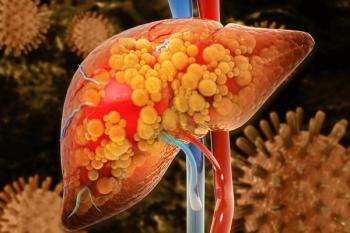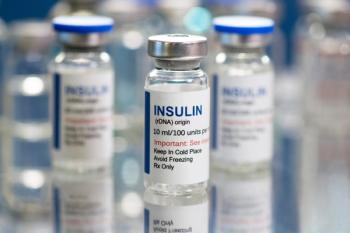
Diabetes
Latest News
Latest Videos

Podcasts
CME Content
More News

Artificial intelligence–powered insulin dosing and virtual coaching offer faster answers and convenience, but accuracy and oversight are key to building trust.

Elise S. Tremblay, MD, MPH, discusses her study on trends in insulin out-of-pocket costs and use disparities from 2008 to 2021, highlighting how health plan structure and income level influenced access and adherence.

Adults with type 2 diabetes, especially those in vulnerable groups, face higher risks of medical debt, low credit scores, and bankruptcy.

As rates of childhood obesity rise, clinicians call for increased data collection to support insurance coverage and safe use of glucagon-like peptide 1 (GLP-1) medications in children under 12 years.

Given trends in cost and use, insulin out-of-pocket cost reduction policies would be more efficient if they targeted members in high-deductible health plans with savings options and low-income patients.

Elevated levels of per- and polyfluoroalkyl substances (PFAS), also known as “forever chemicals,” may be associated with metabolic disruptions potentially leading to type 2 diabetes.

No increased risk of thrombotic events identified despite rise in erythrocytosis among sodium-glucose cotransporter 2 inhibitor (SGLT2i) users with type 2 diabetes, study finds.

Glucagon-like peptide 1 receptor agonists may offer neuroprotective and survival benefits beyond blood sugar control.

Survival models using electronic health record data show promise in predicting progression to proliferative diabetic retinopathy in patients with type 2 diabetes.

An analysis of 1.7 million patients shows semaglutide may significantly reduce Alzheimer and vascular dementia risk compared with other diabetes drugs.

Combining physician education with patient previsit activation increases deprescribing of diabetes medications, according to one study.

Knowledge gaps, financial burdens, and skepticism hinder Hispanic men’s participation in the National Diabetes Prevention Program, a study finds.

Nonalcoholic fatty liver disease (NAFLD) was linked to elevated liver enzymes in type 2 diabetes mellitus (T2DM) in a recent study, urging early detection and comprehensive care.

Sodium reduction is key to lowering blood pressure in adults with type 2 diabetes, a study finds.

Artificial intelligence (AI) can enhance insulin dosing accuracy for hospitalized patients with type 2 diabetes (T2D), improving glycemic control and streamlining physician workflows.

Concurrent hypertension and type 2 diabetes significantly increase mortality risk, emphasizing the need for targeted health interventions to improve outcomes.

Despite advances in diabetes care, new research reveals persistent economic disadvantages for middle-aged adults living with the condition.

A validated questionnaire assesses skills, knowledge, and attitudes for effective gestational diabetes management.

A new study has found increased risks for liver, pancreatic, and bowel cancers following a new diagnosis of type 2 diabetes—but not all obesity-related cancers show a link.

A new review finds federally qualified health centers (FQHCs) are underutilized in hypertension and type 2 diabetes clinical research, despite their potential to improve trial diversity.

New study finds adults with stable housing have slightly better blood sugar and blood pressure levels.

Cardiovascular effectiveness was observed, largely independent of age, in a cohort of older patients with type 2 diabetes.

This article reviews underlying barriers to health care access and discusses how a value-based diabetes care model could improve patient outcomes and reduce long-term costs.

Nearly 1 in 9 adults are living with diabetes, according to new research by the International Diabetes Federation.

A real-world study finds cardiovascular and survival benefits from dual therapy in patients with type 2 diabetes.

















